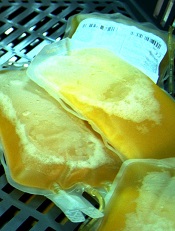
Credit: Cristina Granados
A pooled plasma product that was approved by the Food and Drug Administration in January is now available for use in the US.
The product, called Octaplas, is a sterile, frozen solution of human plasma from several donors that has been treated with a solvent detergent process to minimize the risk of serious virus transmission.
The plasma is collected from US donors who have been screened and tested for diseases transmitted by blood.
Octaplas is indicated for the replacement of multiple coagulation
factors in patients with acquired deficiencies due to liver disease or
undergoing cardiac surgery or liver transplant. Octaplas can also be
used for plasma exchange in patients with thrombotic thrombocytopenic purpura.
Octaplas is contraindicated in patients with IgA deficiency, severe deficiency of protein S, a history of hypersensitivity to fresh-frozen plasma or plasma-derived products including any plasma protein, or a history of hypersensitivity reaction to Octaplas.
Transfusion reactions can occur with ABO blood group mismatches. High infusion rates can induce hypervolemia with consequent pulmonary edema or cardiac failure.
Excessive bleeding due to hyperfibrinolysis can occur due to low levels of alpha2-antiplasmin. Thrombosis can occur due to low levels of protein S, and citrate toxicity can occur with volumes exceeding 1 mL of Octaplas per kg per minute.
Because Octaplas is made from human plasma, it may carry the risk of transmitting infectious agents; for instance, the variant Creutzfeldt-Jakob disease agent.
Administering Octaplas
Octaplas should be matched to the recipient’s blood group to help avoid transfusion reactions. Each lot of the product is tested for composition of key clotting factors and is only released if the levels are within acceptable ranges.
The product is administered by intravenous infusion after thawing, using an infusion set with a filter. An aseptic technique must be used throughout the infusion.
The dosage depends upon the clinical situation and the underlying disorder. But 12 to 15 mL/kg of body weight is a generally accepted starting dose, and it should increase the patient’s plasma coagulation factor levels by about 25%.
It is important to monitor patient response, both clinically and with measurement of prothrombin time, partial thromboplastin time, and/or specific coagulation factor assays.
To order Octaplas, call your local Blood Center or National Hospital Specialties at 800-344-6087. To request product information, call 201-604-1130.
For prescribing information, visit www.octaplasus.com. Octaplas is manufactured by Octapharma USA.


